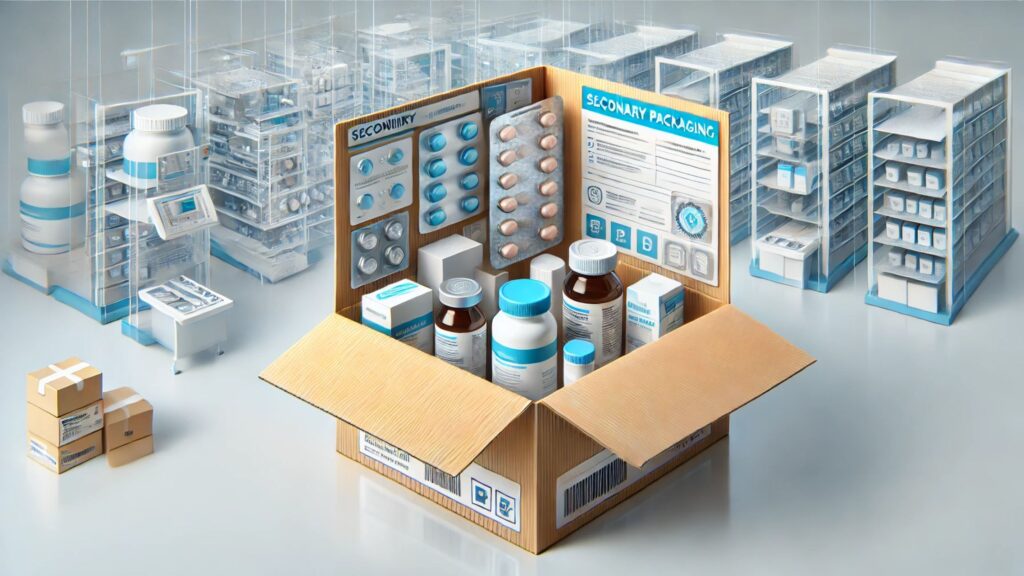Secondary Packaging in Pharmaceutical Industry: In the pharmaceutical industry, packaging plays a critical role in ensuring product safety, compliance, and market appeal. While primary packaging is directly in contact with the drug product, secondary packaging provides additional protection, branding, and regulatory information. Understanding the importance of secondary packaging in pharmaceutical industry is crucial for manufacturers, distributors, and consumers alike.
What is Secondary Packaging in Pharmaceutical Industry?
Secondary packaging refers to the external packaging of pharmaceutical products that groups together primary packaged units. It does not come into direct contact with the drug itself but serves multiple essential functions. Examples of secondary packaging include:
- Cartons
- Boxes
- Labels
- Inserts and leaflets
- Shrink wraps
Importance of Secondary Packaging in Pharmaceutical Industry
- Protection and Safety Secondary packaging safeguards primary packages from physical damage, contamination, and environmental factors such as moisture, light, and temperature variations. This ensures the integrity of the pharmaceutical product until it reaches the end user.
- Regulatory Compliance Compliance with regulations set by organizations like the FDA, EMA, and WHO is critical in the pharmaceutical sector. Secondary packaging must include essential details such as batch numbers, expiration dates, dosage instructions, and safety warnings to meet industry standards.
- Branding and Market Appeal The design and quality of secondary packaging influence consumer perception. Pharmaceutical companies use it to reinforce brand identity, improve product differentiation, and enhance shelf presence, making it an important aspect of marketing strategies.
- Tamper Evidence and Security Secondary packaging often includes tamper-evident features such as seals, holograms, and security labels to prevent counterfeiting and ensure patient safety. This is particularly vital in preventing drug adulteration and unauthorized distribution.
- Efficient Distribution and Handling Secondary packaging aids in the efficient storage, handling, and transportation of pharmaceutical products. Bulk packaging solutions like cartons and cases facilitate streamlined logistics, reducing the risk of damage or misplacement during transit.
- Patient Information and Convenience Leaflets, booklets, and inserts included in secondary packaging provide critical information about the drug’s usage, side effects, and storage conditions. Well-structured secondary packaging enhances patient compliance by making essential details easily accessible.
Trends and Innovations in Secondary Packaging
With advancements in technology and increasing sustainability concerns, the pharmaceutical industry is witnessing innovations in secondary packaging:
- Eco-friendly Packaging: Use of biodegradable and recyclable materials to minimize environmental impact.
- Smart Packaging: Integration of QR codes and NFC technology for digital authentication and enhanced patient engagement.
- Minimalist Design: Reduction in excessive packaging material to lower costs and waste.
Conclusion: Secondary Packaging in Pharmaceutical Industry
Secondary packaging in pharmaceutical industry is more than just an outer layer—it is an essential component that ensures product safety, compliance, and consumer trust. As the industry evolves, innovations in secondary packaging will continue to enhance efficiency, security, and sustainability. Pharmaceutical companies must prioritize high-quality secondary packaging solutions to meet regulatory standards and enhance their market presence.
By understanding and implementing effective secondary packaging strategies, the pharmaceutical industry can ensure product integrity, improve patient safety, and contribute to a more sustainable future.
Related Articles
- The Art and Science of Packaging | Trends, History & Future
- What Is Secondary Packaging? The Essential Guide for Businesses
- The Ultimate Guide to Popcorn Packaging: Innovation, Trends, and Sustainability
- The Art and Science of Honey Packaging: A Guide to Preserving Nature’s Sweetness
- The Future of Takeaway Packaging: Sustainable and Innovative Solutions
- What Is Primary Packaging? A Complete Guide
- The Future of Manufacturing: Primary Packaging Automation
- Chocolate Primary Packaging: Ensuring Freshness, Safety, and Appeal
- Pharmaceutical Primary Packaging: Ensuring Safety and Efficacy
- Primary Packaging Examples: Understanding Their Importance

